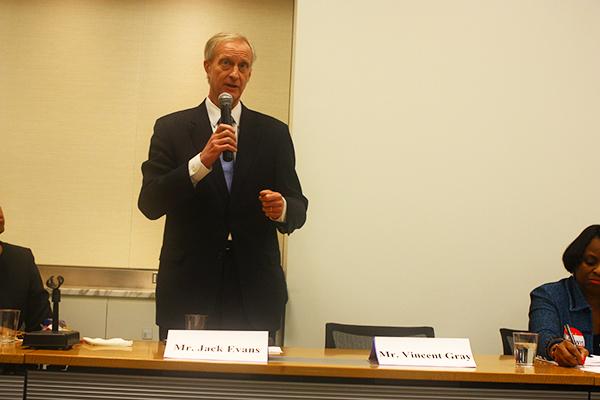About half of D.C’s mayoral candidates, including Foggy Bottom’s own representative, said this week they opposed GW’s effort to expand its police authority off campus.
GW proposed a plan last summer to give University police officers power to respond to issues off campus, after years of arguing with neighbors over how to contain students causing noise complaints, littering and throwing late-night parties.
About six months later, the idea has not moved past conversations among D.C. colleges and universities, UPD Chief Kevin Hay said in an interview last month. Sally Kram, spokeswoman for the Consortium of D.C. Colleges and Universities, said in an email Wednesday that she had no updates.
“This information continues to percolate in the background and no firm date is available for consideration by the Council,” said Karen Sibert, spokeswoman for Council chairman Phil Mendelson.
Mayor Vincent Gray, an alumnus, said in an interview last week that he hopes to increase training sessions with the Metro Police Department and campus police, and said he thought the city could do a better job of working with campus police forces.
“Opportunities are only limited by our capacity to put them on the table and convince these universities to do it,” Gray said.
At a Foggy Bottom debate this week, Council members Tommy Wells and Jack Evans, Busboys and Poets owner Andy Shallal and former State Department official Reta Jo Lewis said they did not support campus police forces working off campus.
“I don’t like the campus police coming off campus in order to enforce things, because they do not know if any of you are students or not. And I don’t want to give them police power over folks that they have to first stop you and ask, ‘Are you a student or are you not a student’?” Wells said.
Evans, who has represented the Foggy Bottom community for 23 years, said he was paying attention to the neighborhood’s concerns.
“I believe the community spoke loud and clear that they did not want that, and I support the community on that on not having GW have police in the community,” Evans said.
Evans, whose ward includes Georgetown University as well as GW, also said he would support universities working closely with neighbors to make decisions about any changes to police jurisdiction in the future.
“The approach I would take is, each community where the universities are located should have a say in if they like the idea or not. Then we can put forward a proposal based on what the community reaction is,” Evans said.
He added that he thought the neighbors’ relationship with GW, which has been strained over the years, has substantially improved.
The University and neighbors have had a historically tense relationship, especially under former University President Stephen Joel Trachtenberg’s 19-year tenure, when he pushed for massive campus development.
Council member Muriel Bowser said while she had “concerns about campus police coming off campus,” she would consider a proposal giving campus police a tight perimeter around campus, if MPD was in agreement. Council member Vincent Orange also said he would support off-campus jurisdiction.
“I would be in favor of campus police actually going beyond their campus and into their immediate community, but beyond that I believe the jurisdiction is of the Metropolitan Police Department,” Orange said.
Senior Patrick Kennedy, chairman of Foggy Bottom’s Advisory Neighborhood Commission, said Wednesday that he was impressed that most of the candidates seemed to have a firm grasp on the issue of off-campus jurisdiction.
“It’s pretty clear to me that most of them were aware of the issue and the community’s concerns. It seemed that the positions they took reflected their awareness of the community’s concerns and that there are still unresolved questions about this proposal,” Kennedy said.








